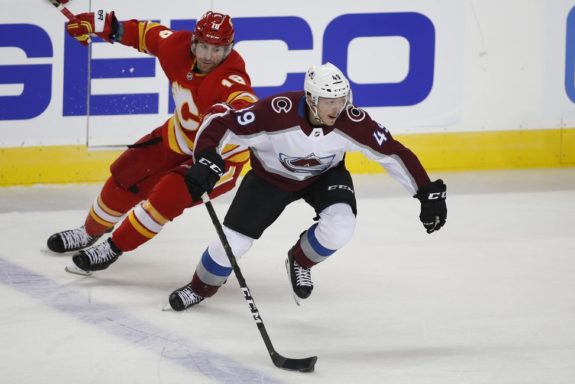The Calgary Flames were the second-best team in the National Hockey League during the 2018-19 regular season, winning 50 games. However, their breakout season came to a screeching halt via a five-game first round series loss to the Colorado Avalanche.

There are several competing theories regarding the Flames’ loss to the Avalanche which try to explain why the more highly-favoured Canadian team lost. The “why” is a subject of debate, but the “how” is rather simple – the Avalanche were better than the Flames.
A One-Sided Series
The Flames finished the regular season with 12 more wins and 17 more points than the Avalanche. But the Avalanche quickly dispatched the Flames in five game series, out-playing the Flames arguably in all five games – though the Flames were right there with them in Games 2 and 4 before allowing late leads to slip away and losing in overtime.
The Avalanche’s top trio of Gabriel Landeskog, Mikko Rantanen and Nathan MacKinnon were the stars of the series. They combined for nine goals and 21 points, with Rantanen playing both with his regular linemates and with Colin Wilson and Carl Soderberg on the second line. Rantanen got better as the series went along, effectively elevating Wilson and Soderberg into a de facto second line that was a big challenge for the Flames defenders.
Other than the goaltending battle, where Mike Smith arguably out-dueled Avalanche netminder Philipp Grubauer and held his team in several games, the Flames were out-performed in virtually every on-ice area.
Testing Out Some Theories
In the aftermath of the Avalanche’s strong series, there have been a handful of theories put forth to explain their dominance over the Flames.
- The Avalanche Finished Stronger Than the Flames: In their last 20 games, the Flames went 11-9-0 and the Avalanche went 11-6-3. The Flames had their playoff position virtually assured while the Avalanche had to push their way in, but they both won the same number of games.
- The Avalanche Were Better Down the Stretch: Via Natural Stat Trick, this theory also doesn’t hold water. During the last 20 games, the Flames held a fairly sizable edge over the Avalanche in Corsi For percentage, Scoring Chance For percentage and High Danger Chance For percentage. In short: the Flames had the puck more and did more with it in their last 20 games than the Avalanche did.
- The Avalanche Had a Tougher Late Schedule: Both teams played eight games against playoff teams over their last 20 outings.
Two Avalanche Adjustments Made the Difference
Within the series, two adjustments made a big difference in determining the outcome – one tactical and one player.
Tactically, the Avalanche did a great job utilizing their speedy forwards on the fore-check to disrupt the Flames’ transition game. Throughout the season the Flames relied upon short, quick passes from the defensive zone into the neutral zone to create offense off the rush. The Avalanche fore-check created tons of turnovers at the Flames’ blue line and made life miserable for them.
“Some of the strengths that we had during the regular season weren’t strengths in Round 1,” said Peters to the media following Game 5. “And I can’t explain it to you why some of those went away. It’ll be interesting as we reflect and look back and try to find some answers.”
The other big adjustment was on the part of MacKinnon. A strong player in the regular season with 99 points – he’ll get Hart Trophy votes but likely won’t win the award – he found another gear in the playoffs, which created havoc for the Flames as they struggled to contain him and scrambled to adjust line match-ups to compensate.
Simply put: the Avalanche played their systems more reliably than the Flames, and MacKinnon elevated his game when his team needed him to do so while the Flames’ stars like Johnny Gaudreau, Sean Monahan and Matthew Tkachuk weren’t able to do so. As a result, the Avalanche advanced to the second round while the Flames are left wondering what could have been.